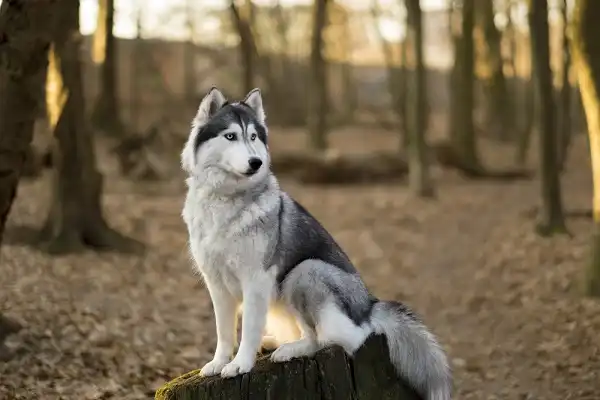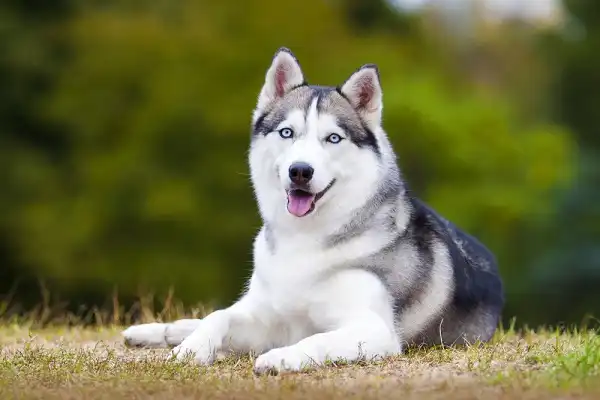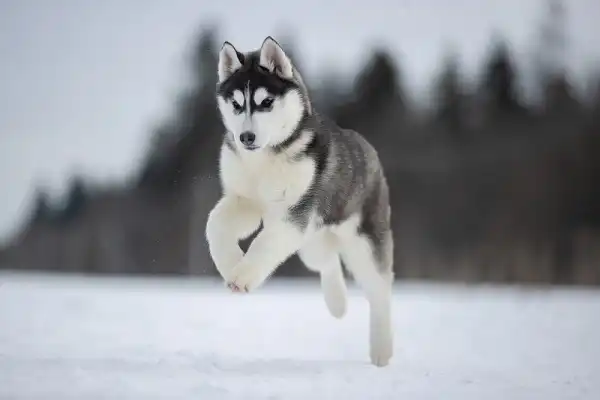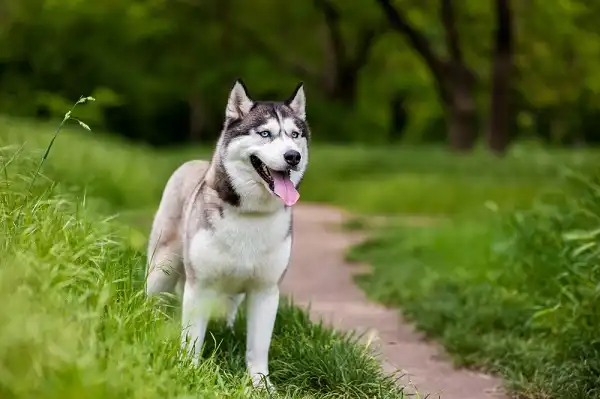If you’re looking for a dog that is both beautiful and intelligent, then the husky is the perfect breed for you. With their thick fur coats and striking blue eyes, huskies are sure to turn heads wherever they go. But it’s not just their looks that make them such special dogs – Huskies are also incredibly loyal and loving companions. So if you’re thinking of adding a four-legged friend to your family, be sure to consider a husky!

Husky Description
Huskies are a majestic breed of dog that is characterized by their thick fur coat, bushy tail, and striking blue eyes. Their coats can range from grey to black and white to red and brown, with some even having a combination of two or more colors. Their intelligence is one of the reasons why they are such popular pets. Huskies are highly trainable animals that excel at working with humans as well as other dogs. They tend to be very social creatures who love interacting with their owners, so much so that they can easily become bored if not given enough stimulation. This makes them perfect for activities like agility training or pulling sleds since they love having a job to do! As pack animals, huskies also thrive when given companionship – either from humans or other dogs.
Husky Habitat
Huskies thrive in cold climates, making them an ideal companion for those living in areas like Alaska or Canada. They are known for their ability to withstand low temperatures and sub-zero conditions, with their thick fur coats keeping them warm in even the harshest of environments. In fact, huskies have been used as working dogs by many cultures throughout history due to their strength and endurance in such climates. In terms of habitat preferences, huskies prefer habitats that provide plenty of space to run and play. This can include large yards, parks, or even wide open spaces like beaches or fields. Additionally, they need access to fresh water at all times in order to stay hydrated – so it’s important that owners make sure they always have access to a bowl of clean drinking water. Huskies also love being around people and other animals. So if you’re looking for a furry friend who will always be eager to join you on walks or hikes, then the husky is definitely a good choice! Plus they get along great with children too – making them perfect family pets.
Husky Diet
Huskies have an appetite and nutritional needs that are very different from other breeds of dogs. They require a diet that is full of high-quality proteins, fats, carbohydrates, and vitamins & minerals in order to maintain good health. A quality diet for huskies should include lean meats such as chicken, beef, or fish; complex carbohydrates such as oats and brown rice; plenty of fruits and vegetables; and healthy fats like olive oil or salmon oil. It’s important to avoid ingredients like corn, wheat, soy, and dairy that can cause allergic reactions or digestive problems in some dogs. Huskies also do well with high-protein diets since they are naturally active animals that need lots of energy. When it comes to portion sizes, owners should feed their husky between 1¼ – 1½ cups of dry food per day (divided into two meals). It’s important not to overfeed these dogs as they have a tendency to gain weight quickly if given too much food. Owners can also supplement their pup’s diet by adding fresh ingredients such as eggs or yogurt for additional protein sources.

Husky Size
Husky size can vary greatly depending on the breed, but generally speaking, they range between 50 to 60cm tall and can weigh up to 28kg. Their thick coat of fur gives them an even larger appearance than their actual size. On average, male huskies are larger than female huskies; males typically weigh around 30–38kg while females usually weigh 25–28kg. Huskies are very active dogs that require plenty of exercises and mental stimulation in order to stay happy and healthy. They love running, playing fetch, hiking, or engaging in various sports activities such as agility training or flyball. As such, they need access to an open area where they can get plenty of physical activity each day – otherwise, they can become bored or destructive when not given enough stimulation.
Husky Lifespan
Huskies are incredibly hardy and resilient dogs that can live up to between 12-14 years on average, with some cases reported of huskies living up to 17 years or more. This makes them one of the longest-living breeds of dog, alongside other large-breed dogs like Mastiffs and Great Danes. Their longevity is likely due to their robust immune systems and their natural resistance to disease. Furthermore, as a breed Huskies are not genetically predisposed to any major congenital diseases and have relatively few health issues overall. With proper diet, exercise, and regular veterinary check-ups throughout their life, Huskies can remain healthy and active for many years. Another factor that contributes to a Husky’s longevity is its coat. Their thick double coat helps insulate them from extreme temperatures both hot and cold which allows them to maintain an appropriate body temperature in all seasons. The protective nature of this coat also shields these dogs from parasites such as fleas, ticks, or mites which can carry potentially fatal illnesses like Lyme Disease or Rocky Mountain Spotted Fever.
Husky Behavior
Huskies are highly active and social dogs that thrive in the presence of their owners. They are incredibly intelligent and can be easily trained to follow commands, although they may need a bit of extra encouragement due to their independent nature. When it comes to behavior, Huskies can be quite vocal when expressing their emotions — they often bark, whine, or howl when excited, anxious, or feeling neglected. It is important for owners to understand what their pup is trying to communicate so that they can respond appropriately and help them feel secure and loved. Training a Husky early on will also help prevent any behavioral issues from developing by establishing firm boundaries while reinforcing positive habits. This includes teaching them basic obedience commands such as sit, stay, and come. Providing your pup with consistent exercise and mental stimulation will also keep them from becoming bored which could lead to destructive behaviors like digging or chewing on inappropriate items.

Husky Speed
Husky speed is a remarkable trait that has been bred into the breed for thousands of years, allowing these canine companions to traverse vast distances with relative ease. A Siberian Husky’s top running speed can reach speeds up to 27 mph (43 kph) for short periods of time and can easily outrun most other breeds on extended runs. While this may seem incredibly fast, it is important to remember that Huskies usually have bursts of energy that require rest periods in between. They are also often able to maintain a steady pace for longer distances as well, allowing them to cover greater terrain than many other breeds. Their incredible stamina and strength combined with their efficient gait make them some of the most efficient distance runners in the canine world. In terms of sprinting, Huskies use their powerful back legs and strong shoulder muscles to propel themselves forward at great speeds while their long tail acts as an additional rudder or stabilizer when they turn at high speeds. Their thick double coat also proves beneficial when running at high speeds – providing insulation against cold temperatures while reducing wind resistance to help them reach even greater velocities!
Husky Hunting
Husky Hunting is a centuries-old practice that owners of this majestic breed have come to love and appreciate. The strong instinctive drive of the Huskies, combined with their physical strength, speed, and tenacity make them an ideal hunting companion. Whether it’s flushing out waterfowl or tracking deer through thick brush, Huskies possess the skill set to be successful in numerous hunting situations. In order to ensure that your Husky is properly prepared for a successful hunt, it’s important to take some time to train them beforehand. Obedience training is key in teaching your pup basic commands such as sit, stay, and heel; these will all be necessary when out on the hunt. Additionally, since these canines are naturally high-energy and love running around outdoors – introducing activities such as agility courses can help tire them out before going on a hunt, as well as provide an opportunity for further bonding between owner & pet. Furthermore, when it comes to actually engaging prey while hunting – Huskies possess an array of tools at their disposal which makes them versatile predators. With their powerful hind legs and long legs, they are able to cover large distances quickly making them great retrievers. Their thick double coat also serves two purposes – not only does it provide insulation against cold temperatures but it also acts as camouflage allowing them to blend in with their surroundings and enabling them to sneak up on prey more easily without being detected. And last but not least – their keen sense of smell keeps them focused and helps guide them toward the game even when visibility is low due to heavy fog or snowfall.

Conclusion
In conclusion, Huskies are undeniably one of the most impressive breeds when it comes to physical capabilities. Whether they’re sprinting across the snow at incredible speeds, navigating through rough terrain while hunting, or simply enjoying a nice walk in nature – these majestic canines have proven time and again their remarkable strength and endurance. With centuries of selective breeding behind them – as well as owners who take the time to properly train and care for them – Huskies truly live up to their reputation as being some of the most skilled athletes around! So if you’re looking for an active companion that can provide years of enjoyment – then look no further than this beloved breed!
Frequently Asked Question


